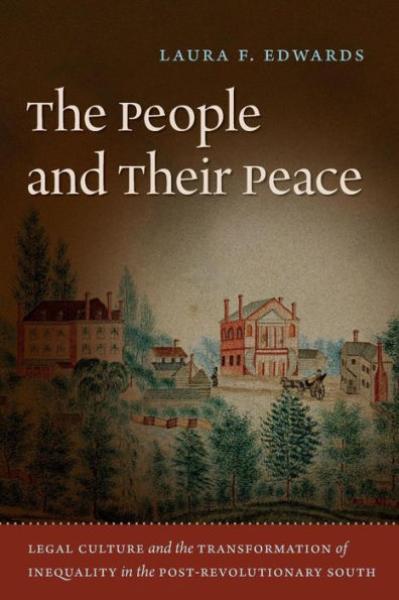Description
Edwards shows that following the Revolution, the intensely local legal system favored maintaining the peace, a concept intended to protect the social order and its patriarchal hierarchies. Ordinary people, rather than legal professionals and political leaders, were central to its workings. Those without rights--even slaves--had influence within the system because of their positions of subordination, not in spite of them. By the 1830s, however, state leaders had secured support for a more centralized system that excluded people who were not specifically granted individual rights, including women, African Americans, and the poor. Edwards concludes that the emphasis on rights affirmed and restructured existing patriarchal inequalities, giving them new life within state law with implications that affected all Americans.
Placing slaves, free blacks, and white women at the center of the story, The People and Their Peace recasts traditional narratives of legal and political change and sheds light on key issues in U.S. history, including the persistence of inequality--particularly slavery--in the face of expanding democracy.
In the half-century following the Revolutionary War, the logic of inequality underwent a profound transformation within the southern legal system. Drawing on extensive archival research in North and South Carolina, Laura F. Edwards illuminates those changes by revealing the importance of localized legal practice.
Edwards shows that following the Revolution, the intensely local legal system favored maintaining the peace, a concept intended to protect the social order and its patriarchal hierarchies. By the 1830s, however, state leaders had secured support for a more centralized system that excluded people who were not specifically granted individual rights, including women, African Americans, and the poor. Edwards concludes that the emphasis on rights affirmed and restructured existing patriarchal inequalities, giving them new life within state law with implications that affected all Americans.
Placing slaves, free blacks, and white women at the center of the story, Edwards recasts traditional narratives of legal and political change and sheds light on key issues in U.S. history, including the persistence of inequality--particularly slavery--in the face of expanding democracy.
People and Their Peace: Legal Culture and the Transformation of Inequality in the Post-Revolutionary South
Laura F. Edwards is professor of history at Duke University. She is author of Scarlett Doesn't Live Here Anymore: Southern Women in the Civil War Era and Gendered Strife and Confusion: The Political Culture of Reconstruction.
An authoritative study on the legal culture of the plantation South. . . . A great book! Highly recommended.--Choice
An important and profound reexamination of the legal culture of the 1789-1840 era. . . . Edwards's arguments are convincing and enlightening. . . . A seminal work that should stimulate further work and a new school of interpretation of American history.--H-Net Reviews
An outstanding and groundbreaking study, one that will in all likelihood change the way scholars look at the law in the southern states for some time to come.--North Carolina Historical Review
Based on deep research in local and appellate court records, statutes, and the papers of jurists. . . . Edwards' efforts to chart a new legal history of the South are admirable and her research is impressive.--Journal of Southern History
Bold and deeply impressive. . . . Surely one of the very finest books ever written on antebellum legal history. It looks to important and neglected sources, is a very sophisticated study, and will repay multiple readings. Its bold thesis will keep scholars busy in the archives, rethinking our own work and generating new insights for decades.--Journal of American Ethnic History
Offers provocative new insights into nineteenth-century southern society. . . . Scholars of slavery, the Old South, and late eighteenth- and nineteenth-century U.S. law ignore it at their peril.--Georgia Historical Quarterly
Proposes an alternative view of the Early National period, one based on records that most historians still do not use. . . . Well worth reading.--Register of the Kentucky Historical Society
Provides a richly textured portrait of a legal culture in which women, African Americans, and the poor played an important part. . . . Offers an important contribution to the literature on the history of the South.--H-Net Reviews
The author's prodigious research in the extant legal records of the Carolinas as well as the challenging interpretations that emerge from this research are the study's great strengths. . . . Where this study succeeds is in its sophisticated analysis of a broad range of records that reveal important insights about ordinary people and their place in the early nineteenth century.--The Journal of American History
This book is destined to be a crucial work in American legal history, but its impact on other fields may be just as great.--American Historical Review
Product Details
- Longleaf Services on Beha Brand
- Apr 30, 2009 Pub Date:
- 080785932X ISBN-10:
- 9780807859322 ISBN-13:
- 430 Pages
- 9.1 in * 6.1 in * 1 in Dimensions:
- 1 lb Weight:




